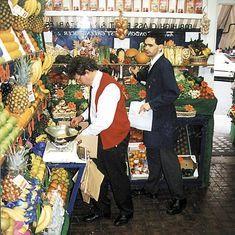
The trade has been left considering the shape of retailing to come with the announcement of Tesco's £53.7 million cash bid for Adminstore, and possible similar convenience store takeovers by Somerfield, Sainsbury's or the Co-op.
"It is a threat," said Cardiff independent retailer Marcus Capel. "They would not be expanding into those markets if they didn't think they would pick up additional business. They are attacking the high street again: They went out of town and now they are pursuing the trade that remains on the high street. The independent retail share of the market is shrinking and this can only accelerate that."
Most observers believe that the Tesco acquisition will be referred to the Fair Trading. Tesco though appears confident that the distinction between the supermarket sector and convenience store market, made in the Competition Commission enquiry into the Safeway takeover, is in its favour.
The concern is that the acquisition of the group, which owns 45 Cullens, Europa and Harts stores would leave Tesco in a position to abuse its strength in the retail marketplace.
Tesco had argued when making its statement that it would have less than six per cent of the convenience store sector, even after the purchase of Adminstore. All Adminstores shops are based in the London area.
However, David Rae at the Association of Convenience Stores said: "The OFT has to consider this acquisition in the context of Tesco's 26 per cent share of the grocery market and refer the takeover for full investigation by the Competition Commission.
"It is no longer acceptable for the competition authorities to ignore the impact of the supermarket giant's encroachment into the neighbourhood-shopping sector."
And the issue of whether convenience and supermarket retailing really are two different markets is likely to become more contentious as Sainsbury's, Somerfield and the Co-op have all been linked this week with possible C-store acquisitions.
Sainsbury's and the Co-op are both rumoured to be interested in the TM Group, the last remaining independent c-store business - which owns the Martins and Forbuoys chains with about 1,200 shops.
Sainsbury's already owns 109 convenience stores in the form of its Sainsbury's Local and Sainsbury's Central stores. All a spokeswoman for the store would say was: "We do not comment on rumour and speculation".
Meanwhile Somerfield, heightened speculation that it will bid for Londis, by announcing that it wants a franchise network to accelerate its expansion and reduce procurement costs. A spokeswoman said: "We are monitoring progress at Londis but have had no formal executive discussions regarding the situation. Our policy is to not comment on takeover speculation."
And wholesalers are also considering their position. "The supermarkets are already in the C-store market," said Nottingham-wholesaler Brian Daykin, chairman of the Fresh Produce Consortium wholesale division. "And in that context, the acquisitions would not change things for the wholesale sector. But the impact may come depending on whether the supermarkets use their existing suppliers to service the convenience stores. Only time will tell the impact on individual independent retailers: if there is no competition in the immediate vicinity, that impact may not exist. Also the sales of fruit and vegetables in C-stores are often negligible, so unless the supermarkets are planning a dramatic change and are going to try and promote fruit and vegetables in C-stores, there may not be much impact there."
Liverpool Market Tenants' Association president Geoff Wells foresees effects in the longer term. "The [convenience] stores don't perhaps sell a lot of fruit and vegetables individually, but overall between them they all sell quite a bit," said Wells. "I don't think it will have an immediate effect on our market but overall the effect on the trade eventually will be of more business moving to the supermarkets."



